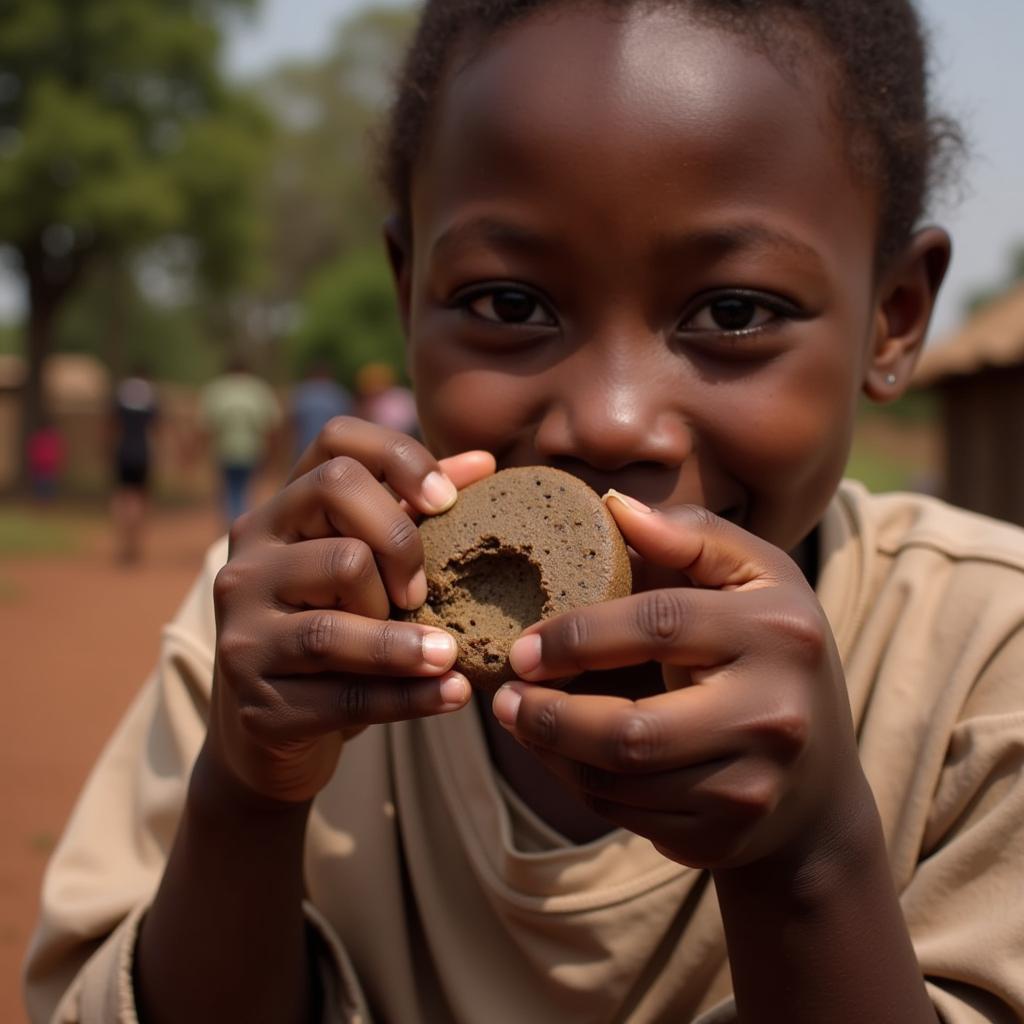African Country Eating Mud Cake: A Deeper Look
The practice of eating mud cake, or geophagy, is prevalent in some African countries. It’s a complex tradition with cultural, nutritional, and even spiritual significance, far beyond a simple dietary quirk. Let’s explore the reasons behind this intriguing practice.
Why Do People in Some African Countries Eat Mud Cake?
While the idea of eating mud might seem strange to some, in certain African cultures, it’s a deeply ingrained tradition with various explanations. These range from addressing nutritional deficiencies to satisfying cravings and even cultural beliefs connected to the earth. It’s not just about eating any mud, though; specific types of clay are often selected and prepared carefully, sometimes mixed with other ingredients to create what’s often referred to as “mud cake.”
One of the leading theories behind geophagy revolves around the mineral content of clay. Many clays are rich in essential minerals like iron, calcium, and zinc, which can be lacking in local diets. Pregnant women, in particular, are often observed engaging in geophagy, possibly to supplement their mineral intake during pregnancy. Additionally, clay can bind to toxins and harmful substances in the digestive tract, potentially offering a protective effect against certain illnesses.
Beyond nutritional benefits, mud cake also holds cultural and spiritual significance in some communities. It can be a part of traditional ceremonies, a symbol of connection to the land, or even a form of comfort food. Understanding these diverse reasons provides a richer understanding of this complex cultural practice.
After the first rains, women in certain communities will go out to collect the specific clay they use for mud cakes. This clay is then carefully processed, often by drying and pounding it into a fine powder before being mixed with water and sometimes other ingredients like spices or even small amounts of food. The resulting mixture is then shaped into cakes and often dried or lightly cooked before being consumed.
Exploring Geophagy: Mud Cake and its Cultural Significance
The cultural significance of mud cake varies across different African communities. In some cultures, it’s a ritualistic practice, often linked to ancestral beliefs or ceremonies related to fertility and the earth. For others, it’s a more commonplace dietary addition, similar to eating a mineral supplement.
The Nutritional Aspects of Eating Mud Cake
The nutritional aspect of consuming mud cake remains a subject of ongoing research. While clay can be a source of certain minerals, it’s crucial to understand the potential risks involved. Some clays can contain harmful contaminants, and excessive consumption can interfere with the absorption of essential nutrients. Therefore, understanding the specific composition of the consumed clay is crucial.
Understanding the Risks and Benefits
While some studies suggest potential benefits, further research is needed to fully understand the long-term health implications of geophagy. It’s crucial to approach the topic with a balanced perspective, acknowledging both the potential benefits and risks associated with this practice.
Mud Cake in Africa: FAQs
What does mud cake taste like? The taste varies depending on the type of clay and any added ingredients. It’s often described as earthy, slightly salty, or even chalky.
Where is eating mud cake most common? While practiced across several African countries, it’s particularly prevalent in regions with specific types of clay readily available and with potential dietary deficiencies.
Is it safe to eat mud cake? It depends on the clay’s composition and preparation methods. Some clays can contain harmful contaminants, so it’s important to understand the source and processing involved.
Why do pregnant women eat mud cake? It’s thought that pregnant women engage in geophagy to supplement mineral intake and potentially alleviate nausea.
Is mud cake a cultural practice or a sign of poverty? Both. While linked to poverty in some cases, mud cake also holds deep cultural significance in many communities.
Is there a connection between mud cake and spirituality? In some cultures, mud cake is associated with spiritual beliefs related to the earth and ancestral connections.
Are there any modern-day alternatives to mud cake for mineral supplementation? Yes, there are many safer and more effective ways to address mineral deficiencies through a balanced diet and appropriate supplements.
 Eating Mud Cake: An African Tradition
Eating Mud Cake: An African Tradition
Conclusion: Understanding the Complexities of Eating Mud Cake in an African Country
The practice of eating mud cake in certain African countries is a fascinating example of the interplay between culture, nutrition, and tradition. It’s a complex practice with potential benefits and risks that requires further research and a nuanced understanding. While it might seem unusual from an outsider’s perspective, recognizing the historical and cultural context is crucial to appreciate its significance within these communities.
Dr. Abena Osei, a renowned anthropologist specializing in African foodways, states, “Geophagy is not simply a dietary quirk; it’s a deeply embedded cultural practice with a history that often intertwines with beliefs about the earth and the body.” Understanding these nuances is crucial to appreciating the complexities of this tradition.
Another expert, Professor Kwame Nkrumah, a leading expert in nutritional anthropology, adds, “While there are potential nutritional benefits to geophagy, it’s essential to consider the potential risks associated with consuming certain types of clay. Further research is needed to fully understand the long-term health implications.” This highlights the need for a balanced approach to understanding this practice.
Need more information on African culture and lifestyle? Explore more of our insightful articles on African Life.
If you need further assistance, please contact us:
Phone: +255768904061
Email: kaka.mag@gmail.com
Address: Mbarali DC Mawindi, Kangaga, Tanzania.
Our customer service team is available 24/7.

